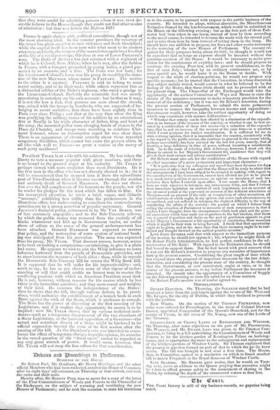President TYLER is at odds with his subjects. He has
taken the liberty to veto a measure popular with great numbers, and there is no bound to the general anger at his audacity. Mr. TYLER is perhaps viewed with more suspicion than most Presidents. He is the first man in the office who was not directly elected to it ; for it will be remembered that he stepped into it from the subordinate post of Vice-President when it became vacant through the sudden and untimely death of General Il semsoss He does not there- fore owe the full complement of his honours to the people, nor did he render his pledges for the trust which has fallen to him. On his unexpected elevation, he wrote a brief, vague, and didactic "message," exhibiting less ability than his predecessors in the illustrious office, but endeavouring to conciliate his semi-voluntary constituents by a strong assertion of popular supremacy. General JACKSON'S financial policy, persevered in by Mr. VAN BUREN, was of late extremely unpopular ; and to the Sub-Treasury scheme, by which the public money was removed from the custody of all banks whatsoever and laid up in Government vaults, an undue share of odium as the cause of the general embarrassment has been attached. General HARRISON was expected to reverse that policy, and the restoration of some system of national bank- ing was anticipated from his accession. The same was expected from his proxy, Mr. TYLER. That discreet person, however, seems to be bent on making a compromise—on trimming, to give it a plain bad name. He appears to wish to join the Whig influence to some influence borrowed from the parade of Democratic principles, and to steer between the measures of both sides : thus, while he repeals the Democratic Sub-Treasury Bill he vetoes the Whig Bank Bill. It is supposed that he will suffer for his impracticability : and, Booth to say, be has as yet shown none of that vigour of under- standing or will that could enable an honest man to master the conflicting passions with which an American President must deal. He is not, however, without reasons for the course which he has taken in the immediate question ; and they seem sound and weighty of their kind. He assumes the independence of the States : then he shows that the bill, through various defects in its provi- sions, would authorize the establishment of a branch bank in each State against the wish of the State, which it professes to consult. The State has the power of dissenting at the first meeting of its Legislature, and if it neglect thpt opportunity its assent is to be implied: now Mr. TYLER shows, that by various technical acci- dents—such as a temporary disagreement of the two chambers of a State Legislature, or the personal opposition of a Governor—the actual and notorious dissent of a State might be hindered in its official expression beyond the term of its first session after the passing of the bill. As the President's veto was intended to coun- teract the effect of temporary changes in public opinion, its exercise in the vexed question of the "fiscal agent" cannot be regarded as any very great stretch of power. It would seem, however, that Mr. TYLER will not reap the less odium for that consideration.


























 Previous page
Previous page